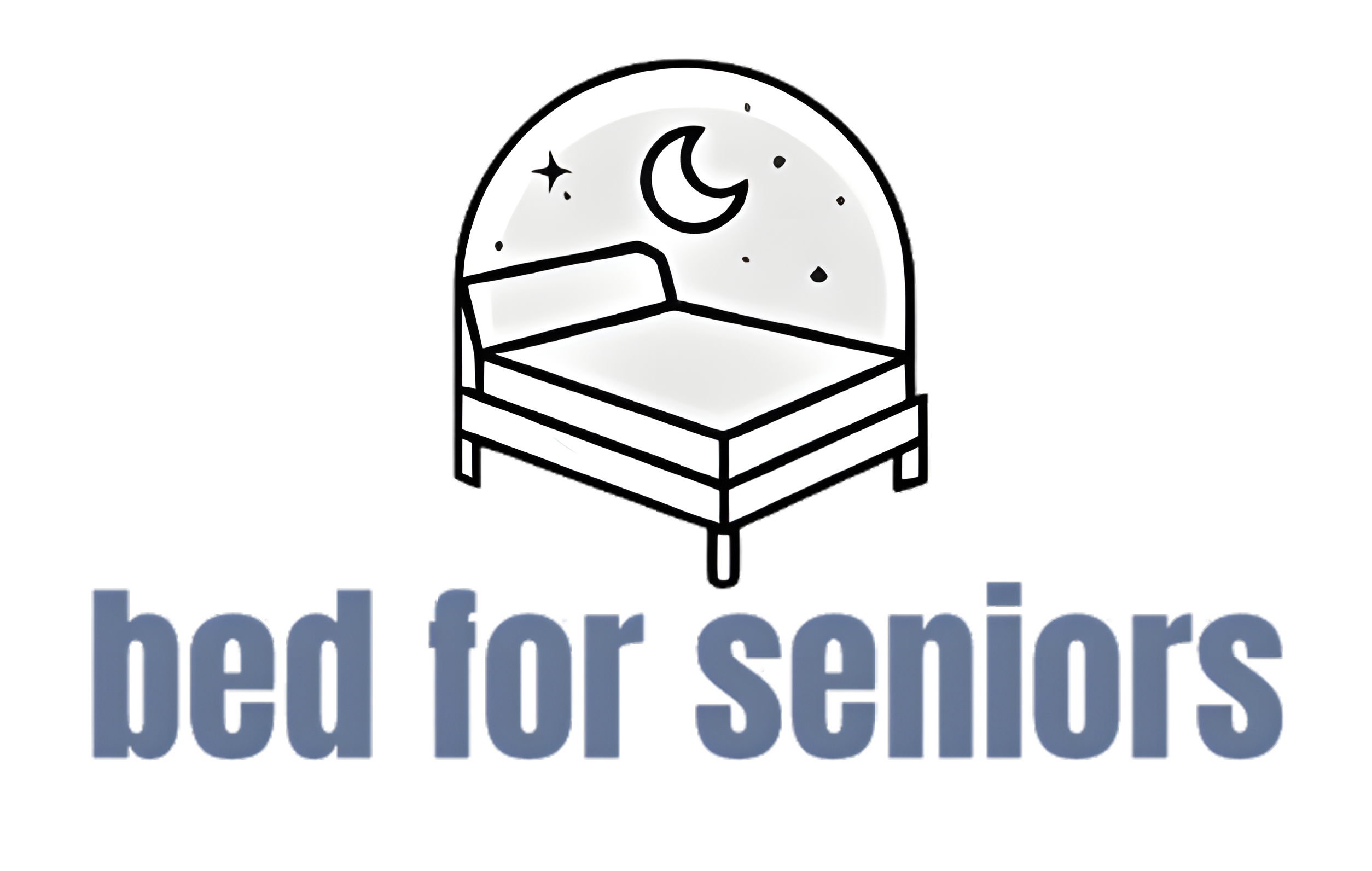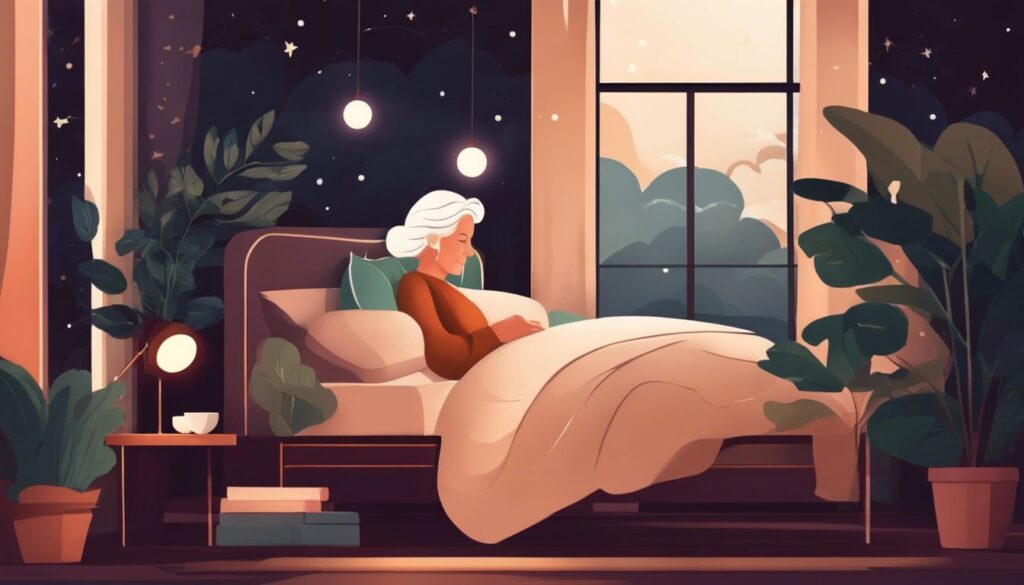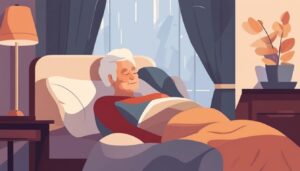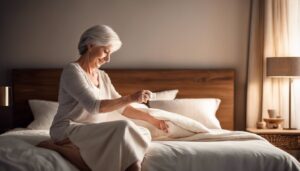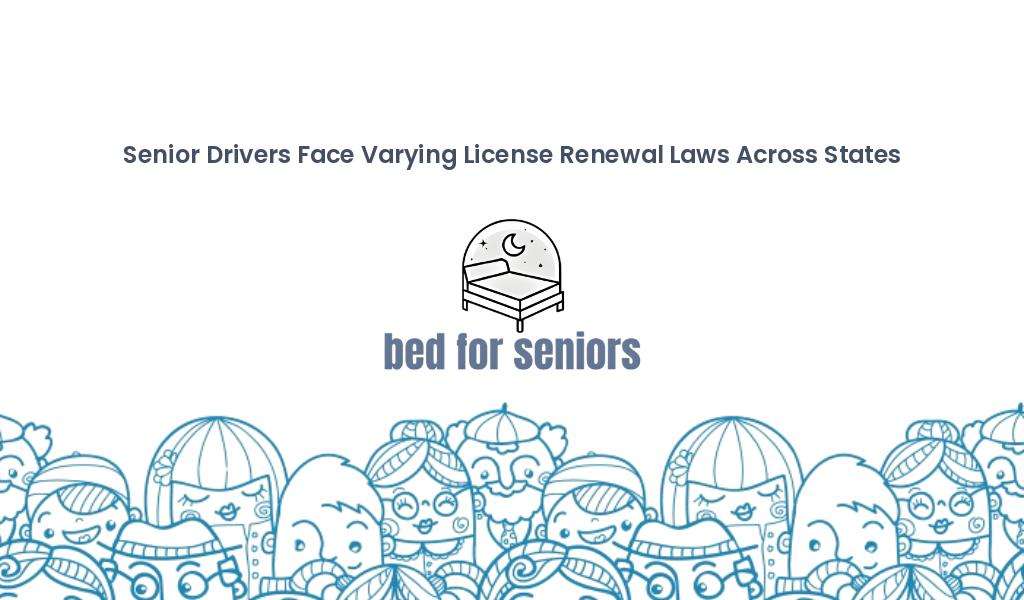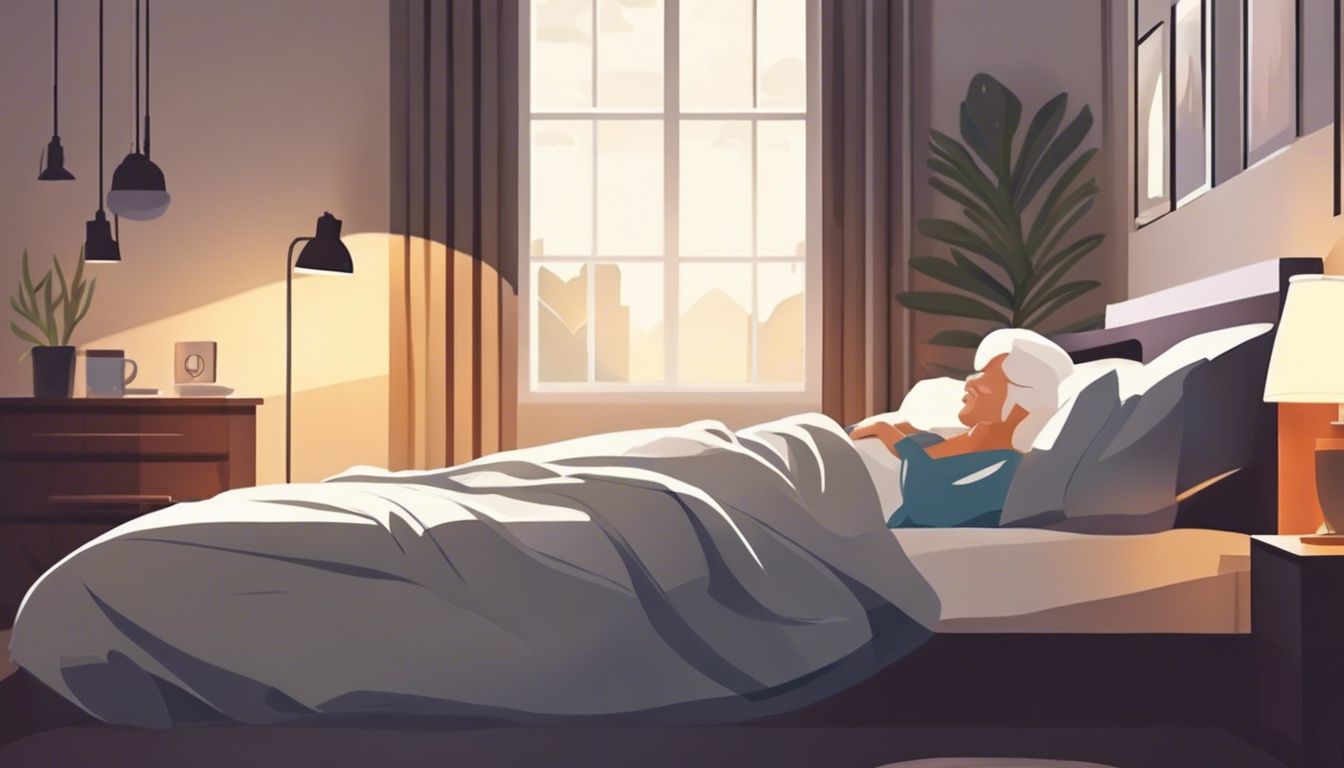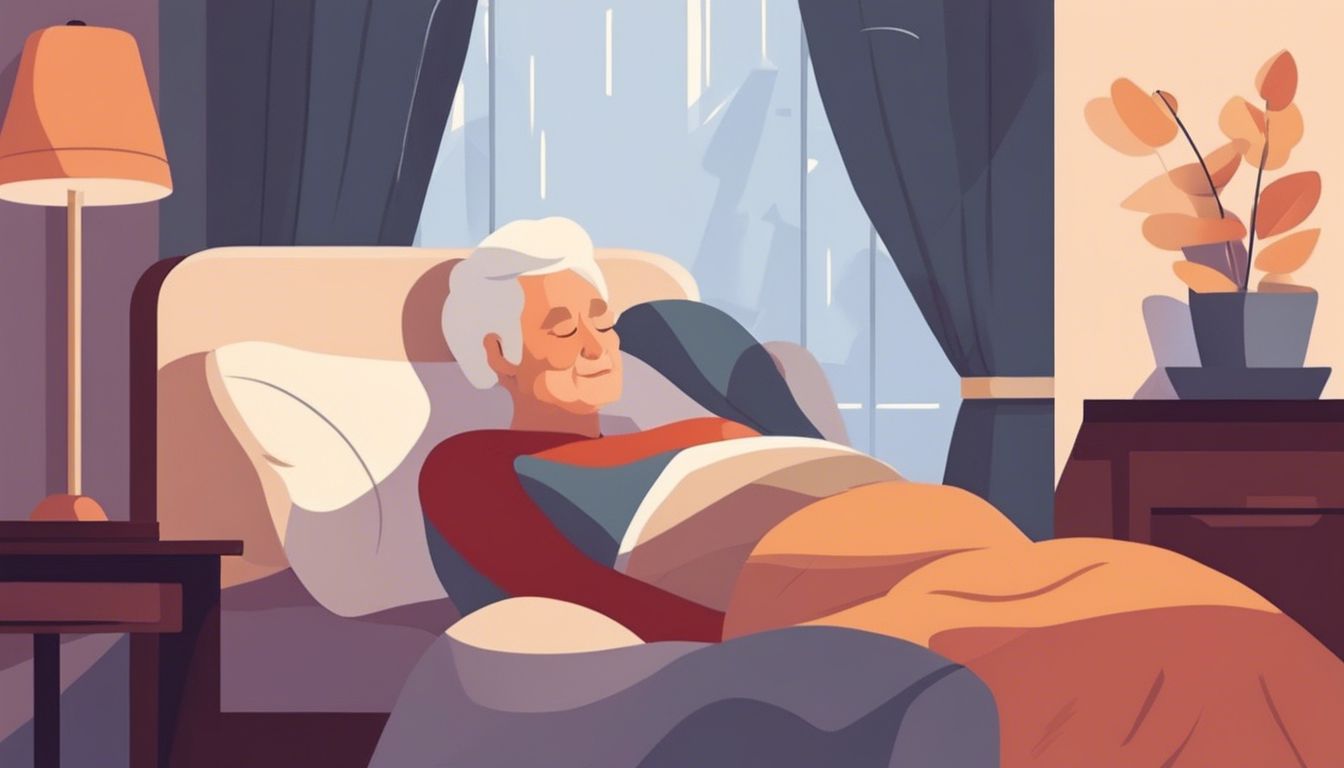Sleep problems in older adults can lead to serious health issues and reduced quality of life. Research shows that 36% of women over 65 take at least 30 minutes to fall asleep at night.
This article will give you practical tips to help your senior loved one get better rest. Read on to improve their sleep and overall well-being.
📋✅
- 36% of women over 65 take at least 30 minutes to fall asleep at night, showing how common sleep issues are for seniors.
- Common sleep problems in older adults include insomnia, sleep apnea, and restless leg syndrome, which can seriously impact health and quality of life.
- Creating a calming bedtime routine, optimizing the sleep environment, and managing diet and exercise can help seniors sleep better.
- The ideal bedroom temperature for good sleep is between 60-67°F (15-19°C), and using low-wattage bulbs or dimmer switches can create a relaxing atmosphere.
- If sleep issues persist despite trying various remedies, seniors should seek professional help, as cognitive-behavioral therapy and other treatments may be needed.
Common Sleep Issues in Older Adults
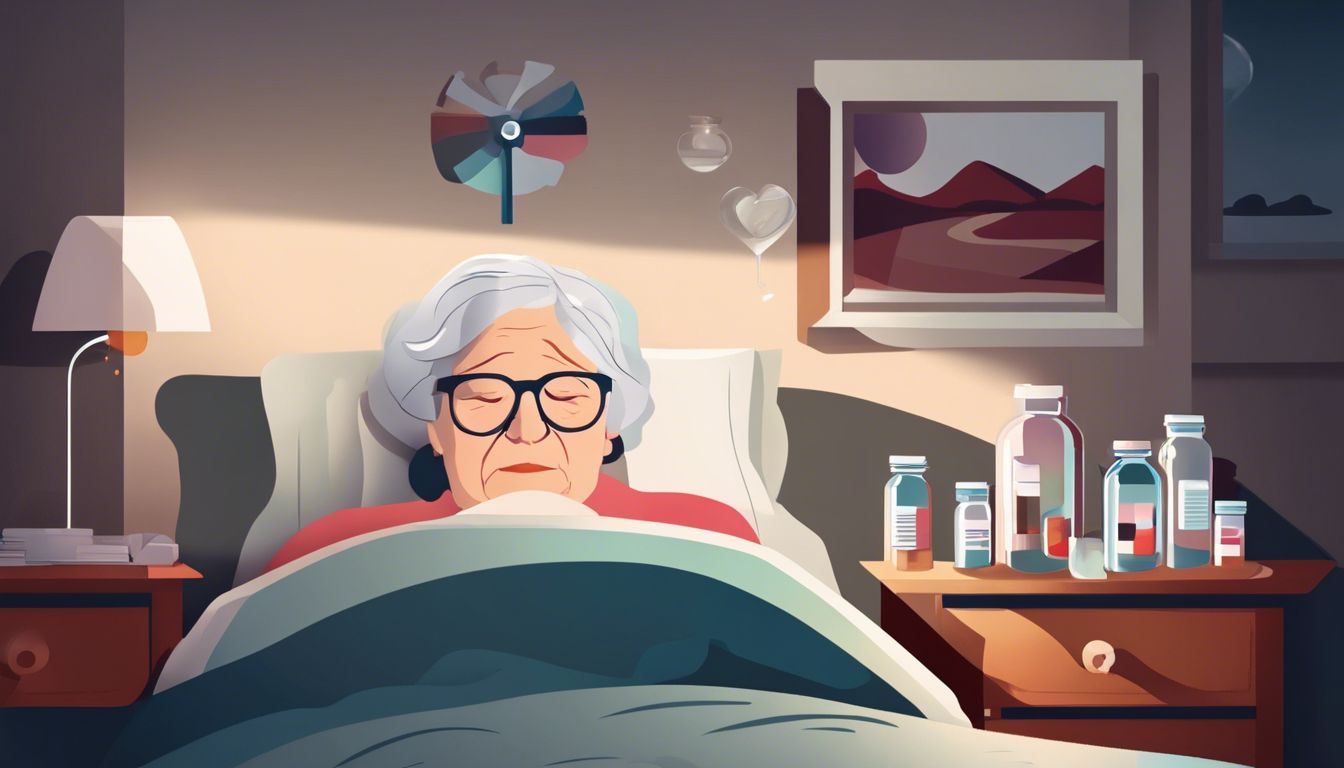
Older adults often face unique challenges when it comes to getting a good night’s rest. Sleep problems can stem from various factors, including health conditions, medications, and lifestyle changes that come with aging.
Insomnia
Insomnia plagues many older adults, disrupting their sleep patterns and overall well-being. This common sleep disorder makes it hard to fall asleep, stay asleep, or both. Caregivers should know that 13% of men and 36% of women over 65 take at least half an hour to drift off at night.
Stress, depression, anxiety, medications, and health issues often contribute to sleeplessness in seniors.
Symptoms of insomnia include trouble dozing off, waking up unrefreshed, daytime irritability, difficulty focusing, and relying on sleep aids or alcohol. These signs can significantly impact a senior’s quality of life and health.
Caregivers play a crucial role in identifying these symptoms and helping their loved ones find effective solutions for better rest.
Sleep Apnea
Moving from insomnia to another common sleep issue in older adults, sleep apnea poses significant health risks. This condition causes breathing to stop and start during sleep, often resulting in loud snoring and daytime fatigue.
Older adults face a higher risk of sleep apnea due to changes in muscle tone and weight gain. The disorder can lead to serious health problems, including high blood pressure, heart disease, and stroke.
Caregivers should watch for signs like excessive daytime sleepiness, morning headaches, and mood changes in their senior loved ones. Encouraging weight loss, adjusting sleep positions, and using CPAP machines can help manage sleep apnea.
Regular check-ups with a sleep specialist are crucial for proper diagnosis and treatment. Early intervention can improve sleep quality and overall health for seniors dealing with this challenging condition.
Restless Leg Syndrome
Restless Leg Syndrome (RLS) plagues many older adults, causing an irresistible urge to move their legs – especially at night. This condition often leads to fragmented sleep and poor sleep quality, leaving seniors feeling tired and irritable during the day.
RLS symptoms typically worsen in the evening or at night, making it hard for sufferers to fall asleep or stay asleep.
Caregivers can help seniors manage RLS by encouraging regular exercise, limiting caffeine and alcohol intake, and ensuring proper iron levels through diet or supplements. Massage, warm baths, and relaxation techniques may also provide relief.
In some cases, doctors might prescribe medications to ease symptoms and improve sleep. Keeping a sleep diary can help track patterns and effectiveness of different treatments for this sleep disorder.
Practical Tips for Better Sleep
Improving sleep for seniors starts with small changes. A calm routine before bed and a comfy sleeping space can make a big difference.
Create a calming bedtime routine
A calming bedtime routine helps seniors wind down and prepare for sleep. Start by setting a consistent sleep schedule. Encourage your loved one to engage in relaxing activities an hour before bed.
This might include reading a book, listening to soft music, or practicing gentle stretches. Dim the lights and keep the bedroom cool and quiet.
A good laugh and a long sleep are the best cures in the doctor’s book. – Irish Proverb
Avoid screens and stimulating activities close to bedtime. Instead, try soothing rituals like a warm bath or light massage. Herbal tea or a small snack can also help. Make sure all medications are taken as prescribed.
A peaceful routine signals the body it’s time to rest, improving sleep quality for seniors.
Optimize the sleep environment
Now that we’ve established a calming bedtime routine, let’s focus on creating the perfect sleep environment. A well-designed bedroom can make a world of difference in sleep quality for seniors.
Start by dimming the lights. Use low-wattage bulbs or install dimmer switches to create a soft, relaxing atmosphere. Turn off all electronic devices at least an hour before bed – their blue light can disrupt sleep patterns.
Ensure the bedroom is quiet and cool, ideally between 60-67°F (15-19°C). If outside noise is an issue, consider using a white noise machine or earplugs. Blackout curtains or an eye mask can block out unwanted light.
Limit bedroom activities to sleep and intimacy – this helps the brain associate the space with rest. A comfortable mattress and pillows are crucial for proper support and alignment.
With these changes, your loved one’s bedroom will become a sleep sanctuary, promoting better rest and overall health.
Manage diet and exercise
Diet and exercise play crucial roles in sleep quality for seniors. Limiting caffeine, alcohol, and large meals before bedtime can prevent sleep disruptions. A light snack with sleep-promoting foods like almonds or cherries may help.
Regular physical activity, especially aerobic exercises, improves sleep patterns. Aim for 30 minutes of moderate activity most days, but avoid intense workouts close to bedtime. A brisk walk or gentle yoga in the early evening can promote better rest.
Hydration matters too, but balance is key. Encourage your loved one to drink enough water throughout the day, tapering off in the evening to minimize nighttime bathroom trips. Some seniors find herbal teas like chamomile soothing before bed.
Next, let’s explore how to choose the right bed for optimal comfort and support.
Choosing the Right Bed for Seniors: Sturdy and Stylish Options
Selecting the perfect bed for seniors requires careful consideration of comfort, safety, and style. A sturdy frame with adjustable features can help older adults maintain independence and improve sleep quality.
Look for beds with easy-to-use controls, allowing seniors to adjust the head and foot positions for reading, watching TV, or sleeping. Memory foam mattresses often provide excellent support, reducing pressure points and easing joint pain – a common issue for many older adults.
Aesthetics matter too. Many modern senior-friendly beds come in sleek designs that blend seamlessly with existing decor. Some options include built-in nightlights or under-bed lighting for added safety during nighttime trips to the bathroom.
Electric beds with massage features can offer extra relaxation, potentially aiding in falling asleep faster. Always consider the senior’s specific needs, such as mobility issues or chronic pain, when choosing a bed to ensure it provides the right support for a restful night’s sleep.
When to Seek Professional Help
Professional help becomes necessary if sleep issues persist despite trying various remedies. Keeping a sleep diary helps track patterns and provides valuable information to doctors.
A primary care physician may refer seniors to sleep specialists or cognitive behavioral therapists for further evaluation.
Cognitive-behavioral therapy (CBT) offers an effective, non-drug approach to chronic insomnia. It targets negative thoughts and behaviors that interfere with sleep. CBT can be done one-on-one, in groups, or online.
For some, prescription sleep aids or herbal supplements may be considered, but their benefits and risks need careful weighing.
Helping seniors sleep better is crucial for their health and happiness. Simple changes like creating a bedtime routine and optimizing their sleep environment can make a big difference.
Regular exercise and a balanced diet also play key roles in improving sleep quality. If sleep issues persist, don’t hesitate to consult a doctor for professional advice. With patience and care, you can help your senior loved one enjoy more restful nights and energized days.
FAQs
1. Why do seniors often have trouble sleeping?
Seniors may face sleep difficulties due to the aging process. Medical conditions, mental health issues, and prescription medications can disrupt sleeping patterns. Restless legs syndrome and sleep-disordered breathing are common culprits. Changes in the sleep-wake cycle and circadian rhythm also play a role.
2. How much sleep do older adults need?
The National Sleep Foundation recommends 7-8 hours of sleep for older adults. But many seniors struggle with insufficient sleep. This can lead to sleep deprivation, affecting their immune system and heart rate. Quality sleep, including deep sleep and REM sleep, is crucial for overall health.
3. What are some natural ways to improve sleep in seniors?
Natural methods can help seniors sleep better. Light therapy can regulate the internal clock. Meditation and cognitive behavioral therapy may ease chronic anxiety. Limiting caffeine and alcohol intake before bed is wise. Creating a calm sleep environment and sticking to a regular sleep schedule can also help.
4. Are sleeping pills safe for seniors?
Sleeping pills can be risky for older adults. They may cause side effects or interact with other medications. Some can increase fall risk. It’s best to consult a sleep medicine specialist or somnologist before using sleep-aids. They can suggest safer alternatives or address underlying sleep disorders.
5. How can caregivers help seniors with insomnia?
Caregivers play a key role in managing insomnia in the elderly. They can help maintain consistent sleep schedules and create relaxing bedtime routines. Encouraging regular exercise and managing daytime naps can improve nighttime sleep. For seniors in care homes, staff should be aware of individual sleeping needs.
6. Can improving sleep help prevent cognitive decline in seniors?
Yes, good sleep is vital for brain health. Chronic sleep deprivation is linked to cognitive decline and may increase the risk of Alzheimer’s disease. Addressing sleep problems through methods like sleep restriction or treating periodic limb movement disorder can support mental sharpness. Quality sleep helps maintain overall health and may slow cognitive changes associated with aging.
